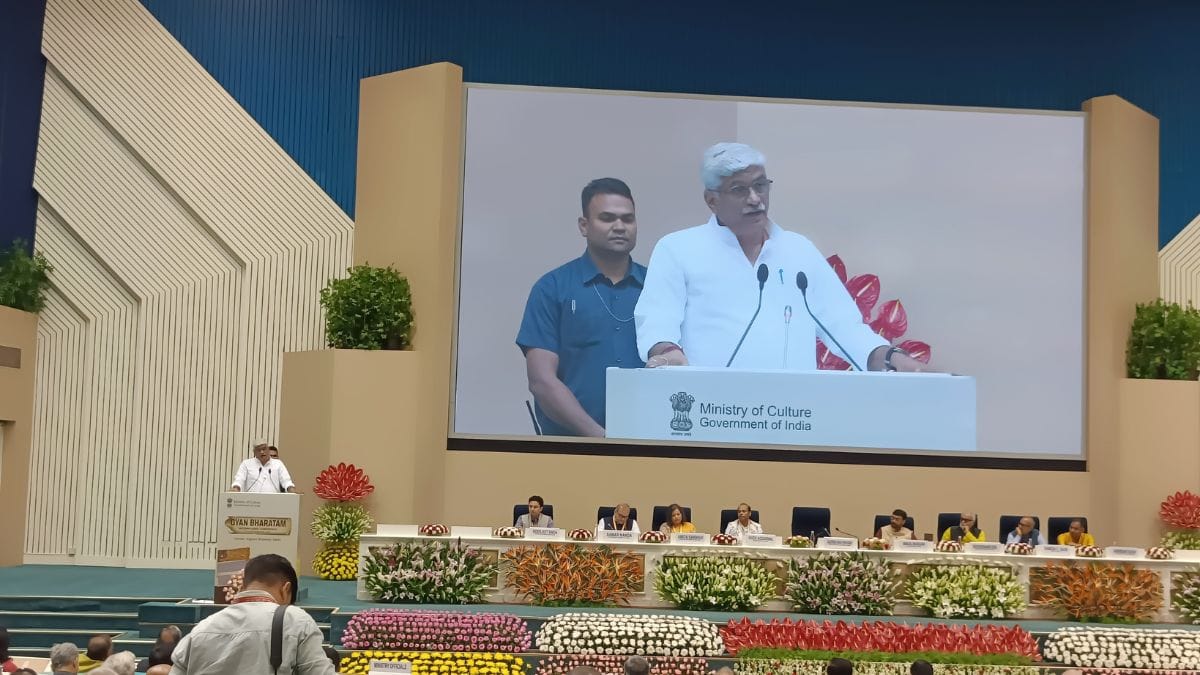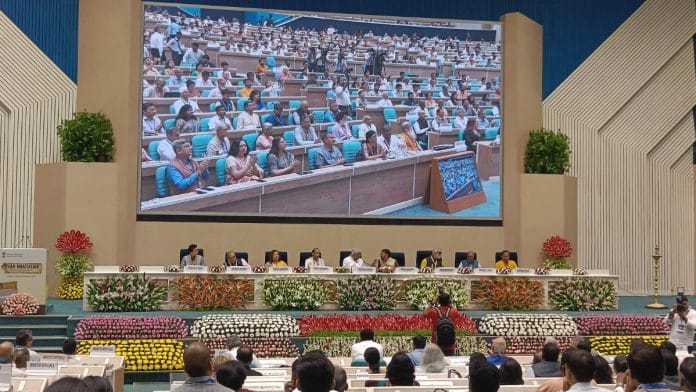New Delhi: Union culture minister Gajendra Singh Shekhawat said India’s knowledge tradition goes back thousands of years, but due to foreign invasion, people lost connection to it
“Gyan Bharatam mission is an attempt to revive that tradition. We have a repository of knowledge and now we are trying to put together all,” said Shekhawat, at the first Gyan Bhartam International Conference on ‘Reclaiming India’s Knowledge Legacy through Manuscript Heritage’ at Delhi’s Vigyan Bhawan.
Shekhawat was joined by union culture secretary Vivek Aggarwal, renowned mathematician Manjul Bhargava, Indira Gandhi National Centre for the Arts (IGNCA) member secretary Sachchidanand Joshi and culture ministry officials at a three-day-long conference. Hundreds of scholars joined the event to share their knowledge.
“India is undergoing through a cultural renaissance under the leadership of PM Modi,” said Shekhawat.
“Our focus is to bring back the knowledge so that people will be proud of it.”
Shekhawat announced the making of a national repository where all the knowledge from the past will be documented.
“Twenty-five clusters, 20 independent centres and 10 centres of excellence across India will work on it,” he said, adding that technology will help in printing, sharing the old manuscripts. “We will take this knowledge to the world.”
Minister of Finance Nirmala Sitharaman announced the Gyan Bharatam Mission in the Union Budget for 2025-26, under which one crore manuscripts will be conserved and documented.
The mission aims to preserve and promote India’s rich intellectual heritage and the move aligns with the Modi government’s broader vision to integrate ancient wisdom with modern education and technology.
Gyan Bharatam mission replaces the existing National Manuscripts Mission, which was launched in 2003 during the Vajpayee government—aiming to digitise all manuscripts in the country, but was moving at a slow pace.
Modi in his Independence Day speech, also mentioned the Gyan Bharatam Mission. He is going to hear the recommendations of the working committee on 12 September.
Shekhawat launched a book of abstracts at the conference, featuring 200 papers on manuscripts and the Indus Script that will be presented by scholars. The conference will also host 25 sessions.
At the Vigyan Bhawan, the archival records of manuscripts are on display for the participants.

Also read: Ahead of PM Modi’s Manipur visit, Patricia Mukhim says no peace without justice
Responsibility to protect heritage
Vivek Aggarwal said the ministry has a responsibility to preserve the tangible and non-tangible heritage for the next generation.
“Manuscripts are not the object for us, but they are living institutions of our heritage,” said Aggarwal. The ideas and the recommendations coming from the three-day-long conference will guide the future of the mission, he added.
Aggarwal said manuscripts have aesthetic and historical value. “We are working on preservation, digitisation, and establishing a link with the custodians of the manuscripts. It will be through a partnership model between the government and different stakeholders,” he said.
He said that wherever the manuscripts are, the Ministry of Culture will contact them to add them to the national repository. “I urge people to come and share knowledge. By sharing, knowledge expands,” said Aggarwal.
At the inaugural session of the conference, keynote speaker Manjul Bhargava said manuscriptology preserves historical knowledge and cultural traditions by deciphering, reconstructing, and analysing ancient texts.
“India’s rich legacy of over 10 million manuscripts offers vast treasures in literature, science, art, and philosophy. A thoughtful revival could spark national pride, cultural preservation, educational enhancements, community empowerment, and catalyse research, potentially leading to an Indian renaissance,” said Bhargava.
Bhargava said manuscriptology has indeed been an important area of study across geographies and across cultures.
“But it is India that perhaps possesses the very richest legacy in classical and local knowledge traditions that would be sure to offer huge benefits to the nation through a thoughtful revival,” said Bhargava.
(Edited by Ratan Priya)






